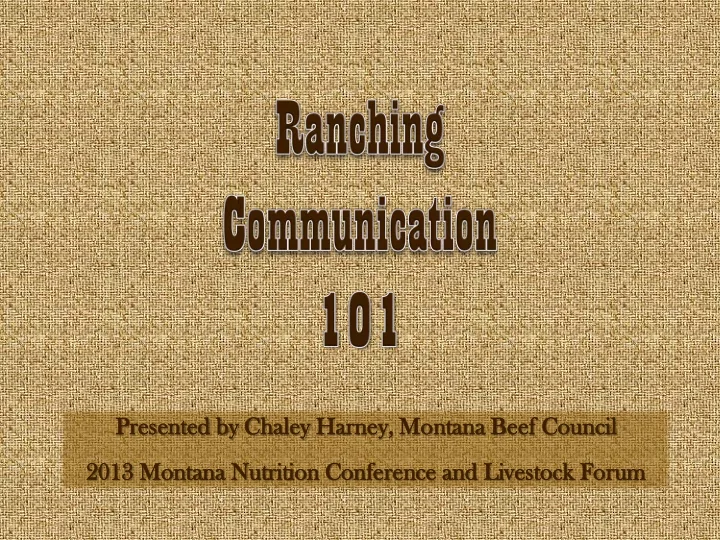

Pre Presented b by y Chale aley Har arney, Mo Montan ana B Beef Coun uncil il 2013 2013 Mo Montan ana N Nut utrit ition C Conference an and Liv ivestock F Forum
Agriculture is Mysterious Declining number of farmers and ranchers in the United States. Consumers increasingly removed from farming and ranching roots. Decreased consumer familiarity w ith agriculture industries.
From Pasture to... ? ...Plate
Advocacy Group Revenue Consumers Union $252 mil HSUS $125 mil Sierra Club $82 mil Greenpeace $40 mil “We have the potential to be one of the most PETA $33 mil powerful forces in politics.” CSPI $19 mil – Wayne Pacelle Union of Concerned Scientists $32 mil PCRM $7 mil Farm Sanctuary $5 mil
Top-Rated NGOs 1. 74% American Red Cross 2. 72% Better Business Bureau 3. 70% Habitat for Humanity 4. 70% American Cancer Society 5. 69% Salvation Army 6. 69% HSUS 7. 68% Big Brothers/Big Sisters 8. 66% American Heart Association 9. 66% St. Jude’s Children’s Hospital
“Our goal is the abolition of all animal agriculture.” –John Goodwin, HSUS Coordinator “It would be better if human beings would stop killing, eating, enslaving, and exploiting animals.” – Whole Foods CEO John Mackey “Organic agriculture is the only sustainable solution for the future…that is our goal.” – Greenpeace director Peter Melchett
Challenging Perceptions “They’re just doing it to make more money” “What goes into the cows, goes into me” “I feel conflicted about beef” “It’s unnatural” “[Beef is] A relatively doomed diet, because of environment & health implications”
Challenging Perceptions “Factory Farming”? Up from 49% in 2008 61% YES 48% associate with beef cattle 58% believe beef comes from “factory farms” 33% concerned about safety of “factory farmed” beef
Consumers Want To Know Q: “Are you interested in learning about how cattle are raised and what life is like on American ranches? 74% 27% 47% 20% 6% Very interested Somewhat interested Not very interested Not at all interested
Gaining Trust Through Authenticity
Standing Up for Beef The Beef Checkoff Program Food Dialogues U.S. Farmers & Ranchers Alliance Social Media Other Commodity Groups Ag-vocates
The Beef Checkoff Program Established w ithin 1985 Farm Bill, became mandatory in 1988 $1/head assessed every time a beef animal is sold Cattlemen’s Beef Board administers program, subject to U.S. Department of Agriculture approval
Importers Dairy, Beef, Veal Producers Pay $1/head or equivalent Pay $1/head State Cattlemen’s Beef 50¢ Beef Board Councils 50¢ Federation State Beef 10 Operating Councils Committee Promoting Researching State National Educating Programs Programs Safeguarding
The Beef Checkoff Program Promotion Research Consumer Information Industry Information Issues Management Helping ranchers tell their story Foreign Marketing Producer Communications
Resources for Ranchers & Consumers
Resources for Ranchers & Consumers
“Agvocate” Training Build on your confidence and credibility Industry training, tools and confidence to speak up and speak out Put a face on modern beef production
Be an Agriculture Activist Show your passion Don’t let misinformation go unchecked Stay on top of current events, be informed Understand the “other side”
Get Up, Get Out & Do Something Presentations Ranch tours Online interaction Media Interview s Letters to the Editor Everyday conversations- grocery store, airport, post office, café
Conversations w ith E.A.S.E. E ngage The first step is engaging the consumer. This could be anyw here. The key is having an attitude of openness, inviting questions and listening to concerns.
Conversations w ith E.A.S.E. A cknow ledge Acknow ledge that consumers have questions & concerns. By inviting questions and listening to concerns, you’re establishing a connection. Look for common ground to build on, not differences.
Conversations w ith E.A.S.E. Remember the 3 Cs: We Care (about the same issues you do) We’re Capable (of raising safe beef w hile caring for animals and the environment) We’re Continuously Improving (to meet your expectations)
Conversations w ith E.A.S.E. S hare Once you have acknow ledged questions and concerns, ask for permission to share your view point. Share personal examples of continuous improvement; consumers are inspired by and curious about w hat you do.
Conversations w ith E.A.S.E. E arn Trust The goal of the conversation is to earn trust. It’s not about w inning an argument or proving you’re right. It’s important to correct misinformation but don’t refute w ith facts alone; food is very emotional. If you don’t trust someone, you don’t trust their facts.
Words Matter We say, “efficient.” Consumers say, “You are cutting corners to make more money.” Talk about using fewer resources instead of producing more food.
Words Matter We say, “safe.” Consumers say, “We don’t know if pesticides, antibiotics or hormones are good for our long-term health.” Talk about how and why you use products judiciously to ensure they are not creating a health concern.
Words Matter We say, “affordable.” Consumers say, “We don’t want cheap food at the expense of quality.” Talk about efforts to raise the highest quality of beef at a price consumers can afford to feed their family.
Words Matter We say, “abundant.” Consumers say, “We have an abundance of food and an obesity problem.” Talk about raising nutrient-rich beef, which provides essential nutrients and vitamins we need in our diet.
Share Your Story An important part of engaging in the conversation about how beef is raised is sharing your personal story. Your story consists of all the everyday things that make you so passionate about raising cattle and providing delicious beef to consumers. YOU RAISE BEEF. You can be the authority on w hat you do.
Recommend
More recommend